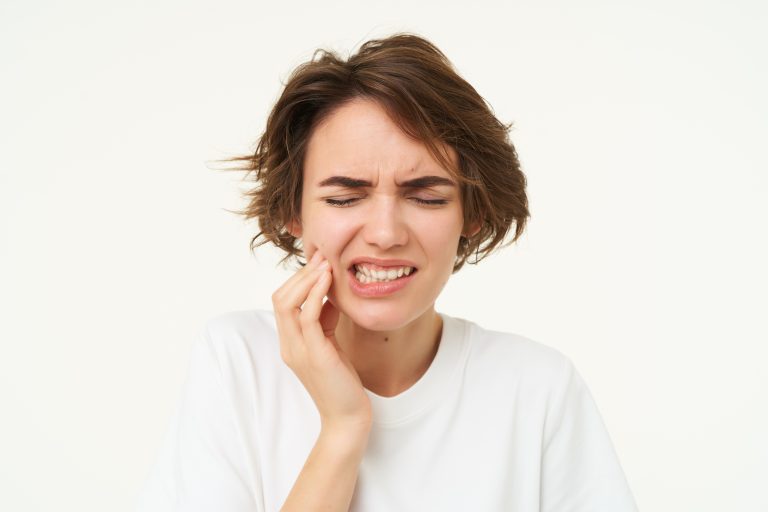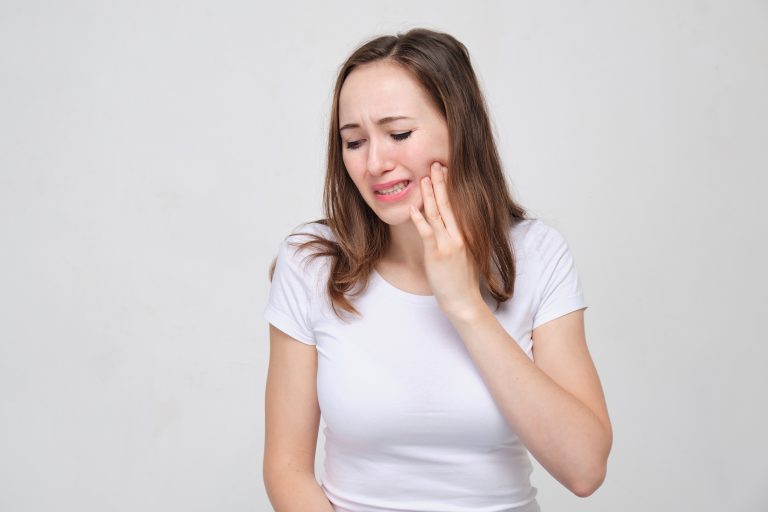


What is Teeth Grinding?
Teeth grinding, medically known as bruxism, is a jaw dysfunction characterized by the individual unconsciously clenching or grinding their teeth. It usually occurs during sleep and can cause erosion in the tooth structure, tension in the jaw muscles and headaches over time. This movement, which is done unconsciously during sleep, affects the teeth, jaw joint and surrounding muscle tissues.
Bruxism, which can also be observed while awake, is usually seen as an involuntary contraction of the jaw muscles during moments of stress, anxiety or intense concentration. Teeth grinding can start in childhood or occur in adulthood. This condition, which shows itself with different symptoms depending on its severity, can be mild or can cause serious teeth and jaw problems in advanced cases.
What are the Treatments for Teeth Grinding?
The aim of the treatment of teeth grinding is to relax the jaw muscles and prevent the teeth from damaging each other. The most common treatment method is the use of a night plate. Custom-made plates prevent direct contact between teeth, prevent abrasions and relieve jaw muscle pressure. Night plates also help protect the jaw joint.
Reducing stress is also important during the treatment process. In cases of psychologically based teeth grinding, relaxation exercises, awareness exercises, and psychological support if necessary are recommended. In some cases, botulinum toxin injections can be applied to reduce muscle contractions. This application alleviates symptoms by limiting excessive work of the jaw muscles.
If there are problems such as excessive wear, fractures or cracks in the tooth structure, restorative procedures and supportive treatments are planned. Different treatment options can be used together depending on the severity of teeth grinding. A multidisciplinary approach should be adopted to successfully manage the process.
What Causes Teeth Grinding While Sleeping?
Nocturnal bruxism, called teeth grinding while sleeping, occurs with involuntary movements of the jaw muscles, especially during the REM phase of sleep. This condition is related to the effects of stimuli related to the central nervous system. Tensions experienced during sleep, accumulation of stressful days or emotional pressures can trigger teeth grinding behavior at night.
Some sleep disorders also pave the way for bruxism. Sleep apnea, restless leg syndrome or inability to fall into deep sleep can cause increased activity in the jaw muscles. Since it occurs unconsciously during sleep, the person is often unaware of this habit.
When waking up in the morning, symptoms such as jaw fatigue, toothache and tension in the head area are felt. Teeth grinding while sleeping is usually detected by sounds heard by a spouse, family member or relatives. This condition can be analyzed in detail with polysomnography tests performed in sleep laboratories. The diagnosis can be clarified by evaluating the muscle movements recorded throughout the night, the jaw closing pattern and sleep stages.
Teeth grinding is called bruxism in medical terms and is a very common problem for many people. It usually occurs as an unconscious habit associated with sleep or stressful situations.
Symptoms
Teeth grinding usually occurs while a person is sleeping, so many people don’t notice it. However, teeth grinding can be associated with certain symptoms. These symptoms include tooth wear, jaw pain, headaches, neck pain, earaches, sleep problems, and gum irritation.
Causes
The exact cause of teeth grinding is not known, but certain factors may trigger it. These include stress, anxiety, anger, sleep apnea, sleeping position, high caffeine and alcohol consumption, fatigue, and abnormalities in the structure of the teeth.
Treatment Methods
Treatment for teeth grinding can vary depending on the underlying cause. Treatment options include the use of splints or dental plates, stress management techniques (such as meditation, deep breathing exercises), relaxation therapy, orthodontic interventions to correct teeth structure, and sleep adjustments. In some cases, doctors may also recommend medications such as muscle relaxants or antidepressants.
Professional Help
If you are experiencing teeth grinding, it is important to consult a dentist or sleep disorders specialist. Depending on the severity of the condition and the underlying causes, experts can recommend the most appropriate treatment options for you.
Things You Can Do at Home
There are some things you can do at home to cope with teeth grinding. These include learning stress management techniques, doing relaxation exercises, reducing caffeine and alcohol consumption, regulating your sleep patterns, and using a mouthguard to protect your teeth.
Remember, teeth grinding can cause serious teeth and jaw problems, so it is important to consult a specialist when you notice the symptoms and to evaluate treatment options.
What Causes Teeth Grinding in Children?
Teeth grinding in children is usually temporary and is considered a part of the growth process. Grinding behavior can be observed during infancy during the eruption of teeth, jaw development, and the placement of new teeth. This behavior is also interpreted as a natural process that contributes to the development of jaw muscles. However, when the habit lasts a long time or significant wear is noticed on the teeth, a specialist should be consulted.
The most common causes of teeth grinding in children include stress, anxiety, attention deficit disorder and environmental changes. Problems experienced in school life, communication problems within the family or having a new sibling can trigger this habit. Night plate application is used more limitedly in children compared to adults. Therefore, behavioral approaches and psychological support are primarily at the forefront of the treatment process. Ensuring the child’s sleep pattern, creating relaxation routines and increasing emotional support contribute to this process.
Problems Caused by Teeth Grinding
Teeth grinding can cause many physical and functional problems over time. One of the most common problems is the wear on the tooth surface. Tooth enamel becomes thin due to long-term friction and this increases the sensitivity of the teeth. At the same time, fillings and coatings can be damaged, cracks or fractures can occur in the teeth.
Increased pressure on the jaw joint can lead to temporomandibular joint disorders. Symptoms such as sound, locking or pain in the joint may occur. Tension in the jaw muscles, headaches, stiffness in the neck and shoulder area are also among the results of grinding. Deterioration in the alignment of the teeth may occur. Structural problems such as facial asymmetry and the lower jaw being pushed forward may develop.
Indirect effects such as decreased sleep quality, fatigue in the morning and lack of concentration during the day may also accompany this picture. The aesthetic appearance of the teeth being short and the deterioration of their structure may also become a significant problem for patients. Problems caused by teeth grinding can be largely prevented with early intervention.
How to Prevent Teeth Grinding?
The main goal in preventing teeth grinding is to eliminate the factors that trigger the behavior. First of all, the individual’s stress level is assessed and, if necessary, supported with relaxation techniques. Methods such as breathing exercises, yoga, and meditation can reduce the tension in the jaw muscles. Paying attention to sleep hygiene and having quality and uninterrupted night sleep reduces the risk of bruxism. It is recommended to maintain jaw awareness in daily life and maintain a neutral position where the teeth are not clenched. This position refers to a situation where the lips are closed but the teeth do not touch each other.
The consumption of hard-shelled foods should be limited and habits that strain the chewing muscles should be avoided. Applying a warm compress to the jaw area at night can also help relax the muscles. Using a night plate prepared by a dentist offers a long-term solution. Plates prevent wear by stopping the contact of the teeth and reduce the pressure applied to the muscles. If there is a disorder in the tooth structure, orthodontic evaluation may be required.
Is Teeth Grinding Psychological?
One of the most important causes of teeth grinding is psychological factors. Stress, anxiety, anger, repressed emotions or intense emotional states can trigger this habit. Teeth grinding can also be considered as a type of defense mechanism developed against the difficulties encountered in daily life.
The subconscious being active while sleeping can cause the expression of repressed emotions during the day and result in teeth clenching behavior. Emotional pressure experienced while awake can lead to involuntary contraction of the jaw muscles. In particular, work stress, social pressures, family problems and personal concerns can make this behavior even more pronounced.
If it is determined that bruxism is psychologically based, physical treatment alone may not be sufficient. Therefore, it is recommended that a psychologist or psychiatrist be involved in the process. Relaxation techniques, behavioral therapies and stress management studies become part of the treatment.
It can be brought to the dentist.
Does a Night Plate Prevent Teeth Clenching?
A night plate is one of the most commonly used protective applications against teeth clenching and grinding habits. Transparent plates specially prepared for the person are placed between the teeth and prevent direct contact of the teeth. In this way, physical damages such as abrasion, cracks and fractures are prevented on the teeth. A night plate also helps reduce pain complaints by balancing the contraction force of the jaw muscles. By controlling jaw movements during sleep, the pressure on the jaw joint is also reduced.
A night plate does not completely eliminate teeth clenching behavior, but it reduces the negative effects of the behavior. It plays an active role in protecting the tooth structure, relaxing the jaw muscles and preventing pain experienced in the morning. Regular use of the plate directly affects the success of the treatment. The plate should be worn as recommended by the dentist, attention should be paid to its hygiene and it should be checked for deformation over time. The effectiveness of the night plate should be monitored with regular checks during the treatment and renewed if necessary.
Frequently Asked Questions About Teeth Grinding
The most frequently asked questions about teeth grinding include whether this habit is permanent, how it damages teeth, and whether it will completely go away with treatment. Bruxism varies depending on the underlying causes. When psychological support and physical measures are applied together, successful results are achieved in most cases. If grinding is not noticed, the damage to the teeth may be irreversible in the long term. Tooth enamel loss, jaw misalignment, and jaw joint disorders may develop over time. The use of a night plate is effective in reducing these risks.
Although teeth grinding is thought to be caused only by stress, genetic factors, sleep disorders, dental structure, and some medications used may also play a role in this behavior. When grinding starts in childhood, it may end in adolescence, but when it starts in adulthood, it often requires intervention. A dental examination is the most accurate method to understand whether bruxism is present. It is possible to overcome this problem with early diagnosis and the right treatment.
Bize Mesaj Gönderin
Randevu Saatleri
Pazartesi – Cuma: 08:00 – 18:00
Pazar günleri ve resmi tatillerde kapalıyız.
İletişim
Yeni Mahallesi İntizam Sokak No:7 Pendik / İstanbul
0216 390 95 80
0505 372 09 26
Hasta Yorumları
Kliniğimizde, sıcak bir karşılama, şeffaf iletişim ve üstün hizmet kalitesiyle, diş sağlığı konusundaki tüm ihtiyaçlarınıza cevap vermeye hazırız.
Kaplamalarımla alakalı gitmiştim kaplamalarımın altında kistler oluşmuştu. İmplant takıldı şuan çok memnunum .Esra hanımdan önce 3 -4 tane dişçiye gittim ama hep problemler çıkardılar kaplamayı takarken dişlerimi kökten kırdılar. En son Esra hanımı önerdiler gittim ve çok memnun kaldım . Eli çok hafif ve işi bilen bir hekim Kanal tedavisi ile dişlerimin tamamını kurtardı. yakınlarıma,aileme tavsiye ettim . Ailemden de gidenler var.

zü...ç
TR
Esra hanıma komşumun tavsiyesi üzerine gittim iyi ki tavsiye etmiş iyi ki gitmişim çok memnunum implant yaptırdım tedavim hala da devam ediyor çok içten bir doktor hastasına güven veriyor ve çok rahatlatıyor ben de herkese tavsiye ederim

em...ş
TR
Sıkça Sorulan Sorular: “Diş Gıcırdatma”
Diş gıcırdatmanın kesin nedeni bilinmemekle birlikte, stres, kaygı, uyku bozuklukları, diş yapısındaki anormallikler, genetik faktörler ve psikolojik durumlar gibi birçok faktörle ilişkilendirilebilir.
Tedavi, diş gıcırdatmanın altında yatan nedenlere bağlı olarak değişir. Tedavi seçenekleri arasında ağızlık veya splint kullanımı, stres yönetimi, gevşeme terapisi, uyku düzenleme, ortodontik müdahaleler ve ilaçlar bulunabilir.
Evet, diş gıcırdatma ciddi diş ve çene sorunlarına neden olabilir. Bu nedenle belirtileri fark edildiğinde, bir uzmana danışmak önemlidir.
Evet, diş gıcırdatma uzun vadede diş aşınmasına, çene eklem problemlerine ve diğer diş sorunlarına neden olabilir. Bu nedenle tedavi edilmesi önemlidir.
